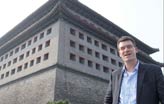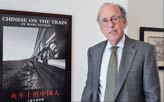Society
Car-free campaign falls flat
Updated: 2011-09-23 10:01
By Xu Wei and Wu Yiyao (China Daily)
BEIJING / SHANGHAI - Efforts by major Chinese cities to join the global drive of World Car Free Day on Thursday failed to impress motorists.
Many cities set up car-free zones and encouraged residents to walk, ride bicycles and use public transport.
However, traffic congestion in Beijing and Shanghai indicated the authorities' promotional effort was far from effective.
Live statistics provided by the Beijing Transport Research Center on Thursday afternoon showed that major roads remained crowded, especially the Second Ring Road.
The only notable change in Beijing took place in the northern part of the city on the streets near the National Stadium - also known as the Bird's Nest - where the municipal government banned private cars.
Traffic in Shanghai on Thursday was not significantly reduced compared with Wednesday's volume, as the reduction was less than 1 percent, according to Shanghai traffic and port authorities.
In the southern city of Guangzhou, the situation was much better after 90 percent of the city's government cars were not used.
"I was surprised to see fewer cars on the roads when I came to work this morning," said Wang Xiaoqi, a taxi driver. "And my cab got around faster than it did yesterday."
The car-free zone in Beijing was set up near the 2008 Olympic Park, where there are fewer residential communities and less traffic.
A traffic policeman in Shanghai, who did not want to be named, said the car-free roads were carefully chosen.
"All the streets in car-free areas are not busy on other days, so we can both offer a gesture to support the car-free campaign but not bring too much inconvenience to drivers," the policeman said.
In Beijing, cars were speeding past the road beside the Bird's Nest without any police intervention despite early warnings from the traffic commission.
In Shanghai, cars broke into the car-free roads on Thursday despite barriers and traffic police officers who closely watched traffic flows.
"Unless we set up a no-car zone in a busier area, we cannot get the message across to motorists," said Huang Shaoyi, founder of environmental NGO Green 2012.
Huang believed stronger media support is needed to promote the notion of a special car-free day.
Experts also believe it is not enough to solely rely on the government's efforts to raise public awareness.
"I still remember World Car Free Day in Munich five years ago," said Duan Liren, a transport expert from Xi'an-based Chang'an University. "Everybody was overwhelmingly excited and it was like liberation day for bicycles.
"When it comes to the idea of a car-free day, the media's promotional power is much more effective than any government department's."
World Car Free Day is an attempt to raise residents' "awareness of energy saving and environmental protection" as cities nationwide are plagued by traffic congestion and pollution caused by the huge number of vehicles on the roads.
E-paper

Pearl paradise
Dreams of a 'crazy' man turned out to be a real pearler for city
Literary beacon
Venice of china
Up to the mark
Specials

Let them eat cake
Cambridge University graduate develops thriving business selling cupcakes

A case is laid to rest
In 1937, a young woman'S body was found in beijing. paul french went searching for her killer

Banking on change
Leading economist says china must transform its growth model soon
